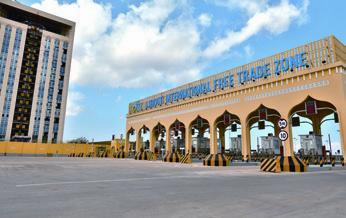Fighting COVID-19 In Africa
2020-06-12ByHuBiliang
By Hu Biliang
The number of novel coronavirus disease(COVID-19) patients in Africa exceeded 158,000 as of June 3. Although the continent accounts for only a small proportion of confi rmed cases in the world so far, the pandemic has dealt a heavy blow to the African economy. The negative impact is likely to continue, and even exacerbate.
Therefore, measures need to be taken to mitigate losses and revitalize the economy, and stronger China-Africa cooperation could be one of them.
Hardest time
The pandemic has caused a great deal of damage to exports. The economic growth of African countries is primarily driven by export of primary products, such as crude oil, mineral ores and agricultural products, making them heavily reliant on foreign trade.
However, due to the pandemic, global demand for these commodities has reduced sharply, making it the hardest time for the African economy.
Whats more, foreign investment in Africa has declined sharply. Owing to the disruptions caused to the global industrial chains, enterprises productions have stopped or partially stopped, bringing new investment to a halt. For a period of time, foreign investment will plunge worldwide, including in Africa.
Thus, economic growth in the continent will see a sharp downturn. After the global fi nancial crisis in 2008, the African economy grew at a fast pace. Last year, it registered a 3.4-percent growth while the global average was only 2.3 percent.
This year, it was expected to grow by 4 percent. However, now the economy is predicted to shrink by 2 to 3 percent, which could lead to great economic diffi culties.
Given these factors, African countries may have a wider balance of international payment deficits and increased debts. Other problems could also arise, such as a depreciation of the exchange rate, higher inflation and rise in the unemployment rate. As a consequence, poverty may escalate and the impoverished population may continue to grow.
This grim situation calls for African countries to resume economic activities in a timely and safe manner, while pooling resources to combat the pandemic.
China-Africa initiatives
In China, positive results have been achieved to contain COVID-19. Based on that, China has basically stabilized industrial and supply chains.

Under the Belt and Road Initiative, China and African countries have already jointly carried out an array of infrastructure programs. Now they need to continue cooperation in these programs.
Anti-pandemic work
For now, the China-Africa cooperation in healthcare under the eight major initiatives can shift the focus as much as possible to prevent a wider spread of COVID-19.
China has done a lot to support Africa to battle the virus. Chinese enterprises have assisted in building a number of specialized hospitals in Africa. For example, the Wilkins Hospital in Harare, capital of Zimbabwe, was upgraded in 17 days, funded by Chinese private enterprises. It became a key medical observation site for suspected COVID-19 patients.
In addition, China has helped African countries improve their capacity to combat COVID-19. For instance, a Chinese medical expert team assisted the Ethiopian Ministry of Health to commission the equipment for a COVID-19 detection lab, enabling the country to acquire the capability of nucleic acid testing.
China has also shared its prevention, diagnosis and treatment plans through various means, including video conferences, telephone discussions and online release of information. By May 18, China had sent seven medical expert teams to African countries to help fi ght the epidemic.
Next, based on the actual needs of African countries, Chinese enterprises could participate in developing African countries emergency response capacity and provide timely medical supplies.
